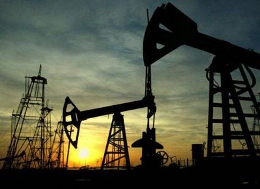 LONDON, Feb 13 (Reuters) - Iranian oil output will likely fall further from its lowest in three decades as the West tightens sanctions on the Islamic Republic, depriving Tehran of hard currency revenues, the International Energy Agency (IEA) said on Wednesday.
LONDON, Feb 13 (Reuters) - Iranian oil output will likely fall further from its lowest in three decades as the West tightens sanctions on the Islamic Republic, depriving Tehran of hard currency revenues, the International Energy Agency (IEA) said on Wednesday.The IEA, the West's energy agency, said in its monthly report that preliminary data suggested Iran's exports could have fallen below 1 million barrels per day (bpd) in January due to lower Chinese and South Korean purchases after a rebound in December to 1.56 million bpd.
January production was hovering below threedecade lows at 2.65 million bpd, a decline of 50,000 from December, the IEA said.
The United States this month introduced new sanctions on Iran as part of a dispute over Tehran's nuclear programme.
The new sanctions effectively bar Iran from repatriating�earnings�from its oil exports, requiring customers to pay funds into an escrow account at a bank in the purchasing country and limiting Iran's use of the proceeds to buying goods in the countries where it exports its oil.
"For Iran, the latest expansion of sanctions is expected to further undermine government finances as its oil export�earnings�are now effectively locked in the buyers' countries," the IEA said.
It estimates that Iran lost over $40 billion in export revenues in 2012 or about $3.4 billion per month.
Iranian exports surprisingly hit a six-month high in December but the IEA said preliminary data for January suggested they could have fallen back to below 1 million as Chinese imports amounted to just over 200,000 bpd.
South Korea�also appears to have reduced imports from Iran in January to 130,000 bpd from 185,000 bpd in December, the IEA said. It said, however, the low January estimate remained subject to revisions.
Iran and Western nations are due to hold a new round of talks over Tehran's disputed nuclear programme on February 26.
"Expectations, however, are low for a breakthrough in the more than decadelong dispute. Indeed, it is unlikely that progress will be made before Iran's June presidential elections," the IEA said.
DEMAND CUT
The IEA was the last of three major energy reports to release estimates this week after OPEC and the U.S. government increased their forecasts for world oil demand growth this year.
OPEC said demand will expand by 840,000 bpd this year, 80,000 bpd more than previously expected, while the U.S. Energy Information Administration raised its 2013 world oil demand growth forecast by 110,000 barrels per day to 1.05 million bpd.
By contrast, the IEA cut its 2013 demand growth forecast by 90,000 bpd to 840,000 bpd following the IMF trimming its global GDP growth forecast to 3.5 percent from 3.6 percent and citing weaker growth in the�euro zone�area and Latin America.
"Despite signs of improvement in�China�and the United States, weak macroeconomic conditions are forecast to keep global oil demand growth capped," it said, estimating global demand in 2013 at 90.7 million bpd.
Global supplies fell by 300,000 bpd in January to 90.8 million bpd with nonOPEC production slipping by 190,000 bpd as North American production growth failed to offset a seasonal downturn in biofuels, production losses in�Australia�and unplanned outages in the North Sea.
For 2013, nonOPEC production is projected to rise by 1 million bpd to 54.4 million bpd, 80,000 bpd above last month's estimate, due to higher output expectations from North America.
OPEC crude supply hit 12month lows in January, off by 100,000 bpd to 30.34 million bpd as slightly higher output by�Saudi Arabia�and Kuwait failed to offset reduced volumes from Nigeria, the UAE, Iran,�Libya�and Qatar.
The IEA said for full year 2013, OPEC's crude supply was expected to fall by 100,000 bpd to an average 29.8 million bpd.
By Reuters
The Iran Project is not responsible for the content of quoted articles.










